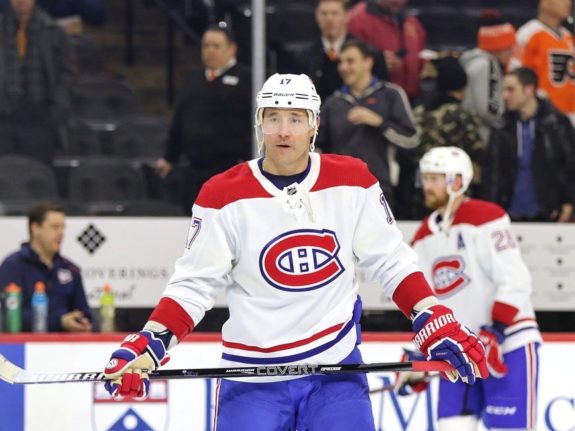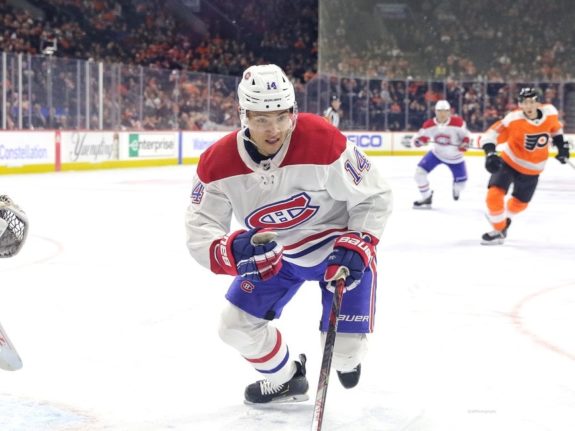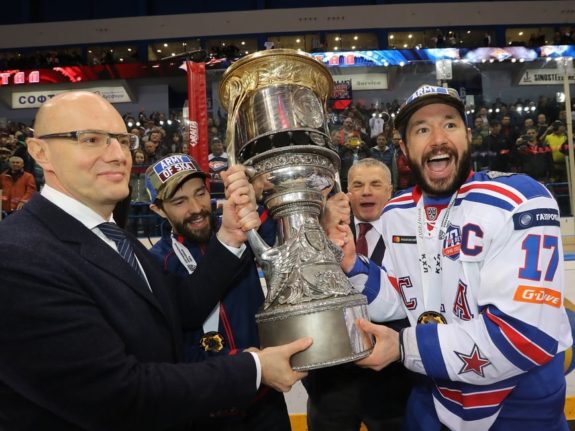When Montreal Canadiens general manager (GM) Marc Bergevin signed Ilya Kovalchuk on Jan. 3, many saw it as a desperation or even public relations move. Since that day, however, the 36-year-old winger has wowed fans with those flashes of greatness he was known for early in his career.
The gamble on Kovalchuk is paying off; he’s providing management and fans with great value. Yet, for a team still in transition, this makes Bergevin’s job that much more difficult. Will Bergevin try to extend Kovalchuk’s contract or will he trade him for any asset that will help with the rebuilding plan.
Should Kovalchuk Stay?
In his short stay in Montreal, Kovalchuk has not only provided skilled plays and overtime-winning goals, he has also provided leadership and even added defensive responsibility to his resume. In his first 12 games, he has scored five goals and 10 points while playing nearly 20 minutes per game on the Canadiens’ top lines and power-play (PP) unit.
A case can be made to keep Kovalchuk, to add size up front. Eric Engels makes that case. It’s alluring to see a big body who is still so offensively skilled, even at 36 years old. It’s no secret the Canadiens need size in their forward group. The team’s forecheck relies on speed, but lacks the size needed to win puck battles. Players like Kovalchuk who can separate players from pucks or shield possession are an asset.

Another issue Montreal continues to face is attracting unrestricted free agents (UFA) to the city. There are a number of reasons UFAs avoid Montreal, such as weather, media scrutiny, and taxes. When one does arrive, and fits in, there will always be a desire to retain their services, especially if they verbalize their appreciation for the team and state they would like to remain:
“They all care, they want to win, they want to be better,” Kovalchuk told reporters after Sunday’s game against the Columbus Blue Jackets. “And all the young guys like (Nick) Suzuki … and (Kotkaniemi) and (Cale) Fleury — they sent them down, but they’re all ready to play. This team has a bright future, and if I can be part of it, that would be really good.”
If he remains, that decision will have to be made prior to the trade deadline on Feb 24. It is a discussion he will have with Bergevin, at which point his contract demands will need to be known, and, if they are kept to a performance bonus-laden contract for one season, it’s likely he will remain with the club into next season.
Also, his role will need to be defined. As mentioned above, he is playing a top-six role, one his skillset and playing mentality suit best. When his ice time and role were cut back by the Los Angeles Kings, he declined rapidly in both productivity and his ability. He simply didn’t fit with the team anymore and was bought out.
Keeping Kovalchuk could have developmental benefits as well. He has built chemistry with rookie center Nick Suzuki. Having a skilled veteran on his wing helps Suzuki make use of his play-making skills and builds confidence in a young player who is already proving he can be a top-six center; he’s in the Calder Trophy discussion, albeit the discussion is mainly quiet whispers out of Montreal. Kovalchuk can also be a placeholder for the team’s youth, allowing Cole Caufield more time to develop in the NCAA before making his NHL debut and lowering the pressure on him to perform at a high level right away.

Another reason to keep him is monetary. Kovalchuk is just fun to watch, and keeping him around will sell tickets and merchandise. After all, professional sports are fundamentally entertainment, and he is entertaining.
Time for a Trade?
Despite his reference to the Habs’ bright future and that he would like to stay, which is nice, can we take Kovalchuk at his word? Is he just saying all the right things to avoid burning any bridges and is keeping his options open? Habs fans heard similar quotes from players like Alexander Radulov before they chose to leave.
Does Kovalchuk really want to remain with a team that is unlikely to make the playoffs this season and will fight tooth and nail to get in next season? Does he want to be a mentor? Does he want to sign a short-term, bonus-laden contract?
In the twilight of his NHL career, does Kovalchuk still want a chance to win a Stanley Cup or is he content with finding his niche with the Canadiens? Most of all, can he maintain his nearly a point-per-game pace?

If his answer to any of the above is ‘No,’ if he says he would like to win, then Bergevin must trade him.
Some fans will claim that they can have both scenarios, that he can be traded then re-signed in the offseason, but in reality that doesn’t happen often. Tomas Plekanec is the example fans use, but it ignores Plekanec’s desire to end his career with the team he played all but 17 of his 1001 NHL games.
The likelihood that Kovalchuk returns if traded is almost zero. If the decision is made to trade him, the return will have to be equal to or greater than the impact he had on the team. The rumors about the return imply that the Canadiens want at least a second-round pick. With 10 picks already in the 2020 NHL Draft, and over 20 picks made in the last two drafts already, the system is flooded with prospects.
Decisions, Decisions
Bergevin is faced with a tough choice. As always, no matter what he decides, it will be scrutinized and either championed or vilified on social media by hoards of the Habs faithful. There are good arguments to be made for both sides but the one that wins out needs to be the one that helps the Canadiens most in the long term.
Kovalchuk was a UFA, meaning he cost nothing but cap space to acquire. Which is more valuable long term, a mentor who’s next contract is unknown or adding another second-round pick that can be used in another trade or add another prospect?
In the end the decision is Bergevin’s, but every team trying to build a contender has done it via the draft, not by extending 36-year-old players in the twilight of their careers.